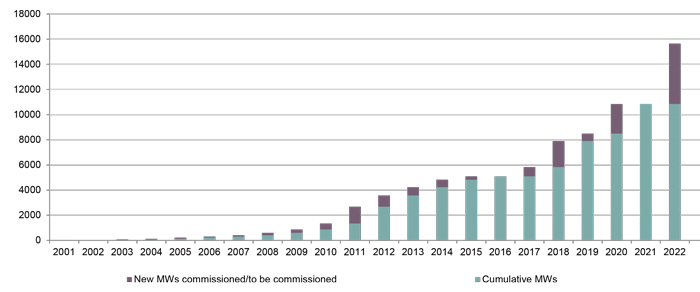In the United Kingdom, we are currently in the process of moving from one support mechanism to another. The old mechanism (that will continue to apply to projects that have already accredited under it) is the RO (a ‘green certificate’ scheme). It is being replaced with CfDs, a revenue stabilisation mechanism which in broad terms fixes revenue at a contractual strike price and which are allocated competitively.
For Brexit to take effect, the European Communities Act 1972 (ECA), which provides for the supremacy of EU law, will need to be repealed. Repealing the ECA would bring an end to the constitutional relationship that exists between EU and UK law. Moreover, the vast amounts of secondary legislation that have been passed with the objective and justification of implementing EU law would have to be considered by Parliament. For further information see the UK and EU legal framework section of our Brexit client site.
The eventual repeal of the ECA will not affect the CfD legislation, which has the Energy Act 2013 as its enabling legislation. However, because aspects of the Renewables Obligation Order 2015 (ROO) which governs the RO rely on the ECA as the primary implementing legislation, the UK Government will need to take some positive action upon repeal of the ECA to preserve the legal basis for the ROO. Whilst we consider this to be a formality, it is nevertheless important that the UK Government manages the repeal of the ECA so as to preserve rights to support under the RO. The ROO is not the only secondary legislation affected in this way. Given the volume of legislation affected, the Government is considering a Great Repeal Bill to grandfather existing regulatory regimes, retaining EU legislation which could then be amended or repealed as appropriate at a later date. For further information on the Great Repeal Bill, please refer to our blog post ‘The Great Repeal Bill’ here.
In many Brexit scenarios (other than the EEA model), the UK will be released from State aid rules which have been influential in shaping the RO and CfD support regimes. Both regimes have already received State aid clearance, and therefore, Brexit is unlikely to have any immediate impact. However, if the UK were no longer bound by EU State aid rules, the Government may have more freedom in both the design and phasing out of renewable energy support regimes. The UK support regimes would however be open to bilateral responses from countries that might believe that any subsidies run counter to principles under the WTO regime, although WTO rules restrict the actions which WTO members can take to counter the effects of subsidies.
In the longer term, investors will also wish to consider how any changes in law introduced as a result of Brexit will affect the project’s power purchase agreement and/or CfD. However, this analysis will only be able to be carried out once any such changes are proposed. Under a typical power purchase agreement, change in law provisions broadly seek to preserve the balance of risk and reward between the contract counterparties following the change in law. The CfD also includes change in law provisions, recognising that for example, if a change in law results in an increase in project costs, generator profits may be eroded as, once the contractual strike price is reached, a generator will not benefit from the ability to recover these costs from consumers via higher electricity prices.






